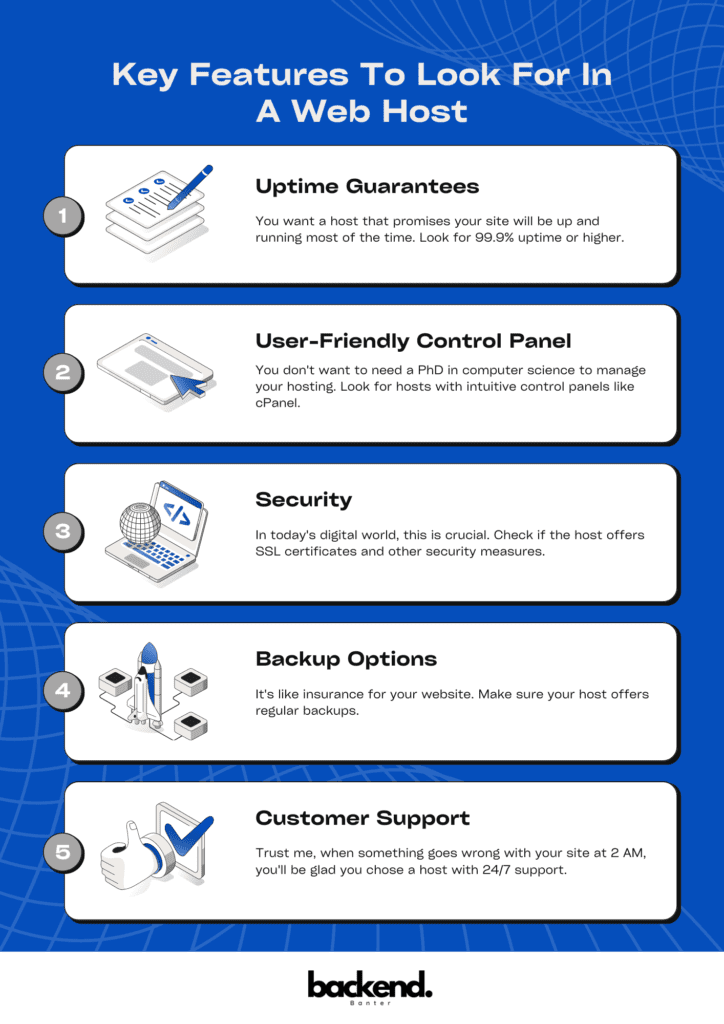Table of Contents
Wow, choosing a web host in 2024 can feel like navigating a maze blindfolded! With countless options and technical jargon, it’s easy to feel overwhelmed. But don’t worry – I’ve got your back! Did you know that 40% of users abandon a website if it takes more than 3 seconds to load? That’s why picking the right web host is crucial. In this guide, we’ll walk through everything you need to know to make an informed decision. Let’s dive in and find your perfect web hosting match!
Understanding Web Hosting Basics
Let’s start by breaking down what web hosting actually is. Think of it as renting space on the internet for your website. It’s like finding an apartment for your digital home. Without hosting, your website would have nowhere to “live” online.

Now, there are different types of hosting, each with its own perks:
- Shared hosting: It’s like living in a dorm. You share resources with others, which makes it cheap but can sometimes be slow.
- VPS (Virtual Private Server): This is more like having your own apartment in a building. You get your own resources, but you’re still part of a larger system.
- Dedicated hosting: Here, you’ve got the whole house to yourself. It’s powerful but pricey.
- Cloud hosting: Imagine your website living in multiple apartments across different buildings. It’s flexible and scalable.
The type of hosting you choose can really impact how your website performs. It’s like the difference between trying to stream a movie on a slow connection versus a fast one. Good hosting means your site loads quickly and stays up reliably, which keeps your visitors happy.
Assessing Your Website’s Needs
Before you start shopping for a host, you need to know what you’re looking for. It’s like buying a car – you wouldn’t get a two-seater sports car for a family of five, right?
First, think about what your website is for. Is it a small blog or a large e-commerce site? The amount of traffic you expect will help determine what kind of hosting power you need.
Then, consider the technical stuff. Does your site use specific programming languages or need databases? Make sure your host supports these.
Storage and bandwidth are important too. If you’re planning to host lots of videos or high-res images, you’ll need more space. And if you’re expecting tons of visitors, you’ll need more bandwidth.
Lastly, think about the future. Your website might be small now, but what if it grows? Look for a host that can grow with you.
Key Features to Look for in a Web Host
When you’re comparing hosts, there are some key things to keep an eye out for:

Comparing Pricing and Plans
Now, let’s talk money. Web hosting prices can vary widely, so it’s important to understand what you’re getting.
Some hosts offer super cheap introductory rates, but watch out – these often jump up significantly after the first year. It’s like those cable TV offers that seem great until you read the fine print.
Make sure you know exactly what’s included in each plan. Some hosts might charge extra for things like backups or migration assistance.
Also, keep an eye out for hidden fees. Some hosts charge for things like setup or cancellation.
Finally, think long-term. Sometimes paying a bit more upfront can save you money (and headaches) in the long run.
Affiliate Notice
All recommendations made within this blog post would have been independently verified by The Backend Banter team throughout our Digital Agency life. We have clients using these 3 hosting providers as well as others and these choices are simply what we have found to be great additions to our numerous projects. As a result, we would have partnered up with the 3 Web Hosting providers to provide a discount to our readers. Any purchases made via the links above will provide The Backend Banter team with a commission fee we use to continue improving the blog and its contents.
Reading and Interpreting User Reviews
User reviews can be incredibly helpful, but you need to know how to read them. It’s like checking restaurant reviews – you want to look for patterns, not just one angry customer who had a bad day.
Try to find reliable sources for reviews. Look for tech websites or hosting-specific review sites rather than just general review platforms.
Pay attention to recent reviews, as hosting quality can change over time. It’s like checking the latest health inspection for a restaurant.
And remember, no host is perfect. Look at both positive and negative reviews to get a balanced picture.
Testing Performance and Speed
Speed matters – a lot. Slow-loading websites can drive visitors away faster than you can say “bounce rate.”
There are tools available online that can help you check server response times. It’s like using a stopwatch to time how quickly a host responds to requests.
Consider where the host’s data centers are located. If most of your visitors are in Europe, a host with servers in Asia might not be the best choice.
Look for hosts that use modern hardware and offer features like caching. These can really boost your site’s performance.
Evaluating Customer Support
Good customer support can be a lifesaver when you’re having website issues. It’s like having a reliable mechanic for your car – you might not need them often, but when you do, you’re really glad they’re there.
Check what support channels the host offers. Phone, chat, email, ticket system – the more options, the better.
Try contacting their support before you sign up. See how quickly they respond and how knowledgeable they are.
24/7 support is ideal, especially if your website is critical to your business.
Also, look for hosts that offer plenty of self-help resources. Sometimes, it’s quicker to solve a problem yourself than to wait for support.
Conclusion
Phew! We’ve covered a lot of ground, but now you’re armed with the knowledge to choose a web host that’ll make your site shine in 2024 and beyond. Remember, the perfect host is out there – it’s just a matter of finding the right fit for your unique needs. Don’t rush the decision; take your time to evaluate your options carefully. Your future website visitors will thank you for it!
Ready to take the plunge? Go forth and find that dream web host – your online success story awaits!
Frequently Asked Questions
What types of web hosting are available, and which one is right for me?
There are several types of web hosting services available, each catering to different needs:
1. Shared Hosting: This is the most economical option, where multiple websites share the same server resources. It’s ideal for small businesses or personal blogs with low traffic.
2. VPS Hosting: Virtual Private Server (VPS) hosting offers more resources and control than shared hosting. It’s suitable for medium-sized businesses that need more power and flexibility.
3. Dedicated Hosting: With dedicated hosting, you have an entire server to yourself. This option is best for large businesses or websites with high traffic that require maximum performance and security.
4. Cloud Hosting: This type of hosting utilizes multiple servers to balance the load and maximize uptime. It’s ideal for websites that experience fluctuating traffic.
5. Managed WordPress Hosting: Specifically designed for WordPress sites, this hosting type offers optimized performance and security features. It’s perfect for users who want a hassle-free experience.
Choosing the right hosting type depends on your website’s size, expected traffic, and technical expertise.
How do I determine the right amount of bandwidth and storage for my website?
When selecting a web hosting plan, understanding your bandwidth and storage needs is crucial:
– Bandwidth: This refers to the amount of data that can be transferred to and from your website. If you expect high traffic or plan to host large files (like videos), opt for a plan with higher bandwidth. For small blogs or personal websites, lower bandwidth may suffice.
– Storage: This is the amount of disk space available for your website files, including images, videos, and databases. Assess the size of your current content and future growth. A general rule is to choose a plan with at least double the storage you currently need to accommodate future expansion.
Monitoring your website’s performance and traffic can help you adjust your hosting plan as needed.
What features should I look for in a web hosting provider?
When evaluating web hosting providers, consider the following essential features:
1. Uptime Guarantee: Look for a provider that offers at least a 99.9% uptime guarantee to ensure your website remains accessible.
2. Customer Support: Reliable customer support is crucial. Choose a host that provides 24/7 support through multiple channels (chat, email, phone).
3. Security Features: Ensure the hosting provider offers SSL certificates, firewalls, and regular backups to protect your website from threats.
4. Scalability: Your hosting plan should allow for easy upgrades as your website grows. This flexibility is essential for accommodating increased traffic and resource needs.
5. User-Friendly Control Panel: A simple and intuitive control panel (like cPanel) can significantly ease website management, especially for beginners.
How important is website speed, and how can hosting affect it?
Website speed is critical for user experience and SEO. A slow-loading website can lead to high bounce rates and negatively impact your search engine rankings. Hosting plays a significant role in website speed due to factors like server location, technology, and resource allocation.
To improve website speed through hosting, consider the following:
– Choose a reputable host: Opt for providers known for their fast servers and reliable performance.
– Select the right server location: Hosting your website on a server close to your target audience can reduce latency and improve load times.
– Utilize Content Delivery Networks (CDNs): Many hosting providers offer CDN integration, which distributes your content across multiple servers globally, enhancing loading speed for users regardless of their location.
Can I switch hosting providers later if I outgrow my current plan?
Yes, you can switch hosting providers if you outgrow your current plan. Most reputable hosting companies facilitate easy migration processes. However, consider the following steps to ensure a smooth transition:
1. Choose a new host: Research and select a hosting provider that meets your current needs.
2. Backup your website: Before migrating, create a complete backup of your website files and databases.
3. Migrate your content: Many hosts offer migration services or tools to help transfer your website seamlessly.
4. Update DNS settings: After migration, update your domain’s DNS settings to point to the new host.
5. Test your website: Ensure everything functions correctly on the new host before canceling your old plan.
Switching hosts can be a straightforward process, but it’s essential to plan carefully to minimize downtime and data loss.
Interested in learning more about Website Host we recommend to gain a better perspective? Then you probably should start with our Hostinger Review or maybe you are curious about WordPress and Maintenance.


